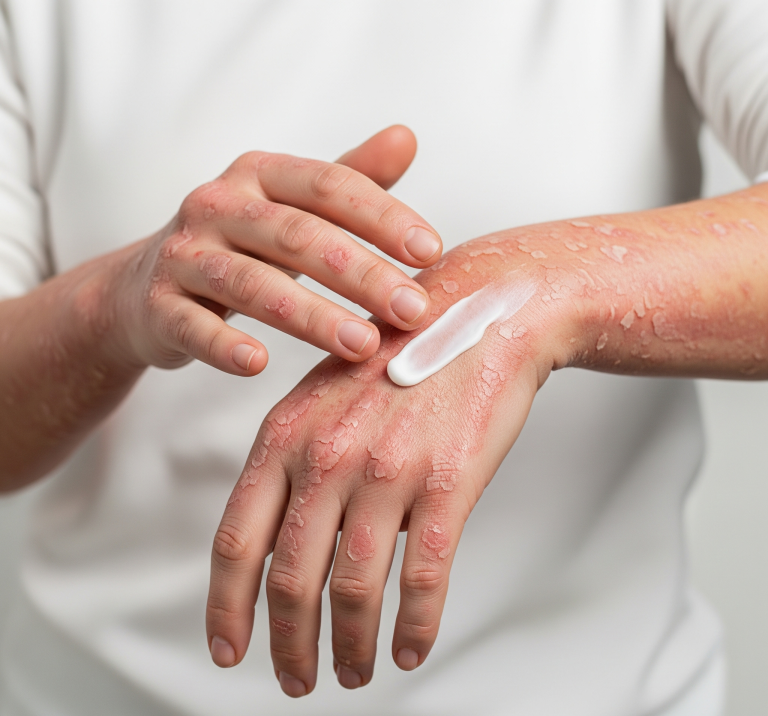
Psoriasis
Psoriasis is a chronic autoimmune skin disorder that causes rapid buildup of skin cells, leading to scaly, red patches, itching, inflammation, and discomfort. While it is not contagious, it can severely impact a person’s physical appearance, confidence, and overall quality of life. At Sanjay Rithik Hospital, our dermatology experts provide personalized, advanced care for individuals living with psoriasis. Whether you’re facing mild flare-ups or severe, persistent symptoms, our goal is to help you manage the condition effectively and restore healthy, comfortable skin.
When the immune system unintentionally targets healthy skin cells, it speeds up the skin cells’ life cycle and causes them to accumulate quickly on the skin’s surface, which leads to psoriasis. This results in thick, scaly plaques that may crack, bleed, or itch intensely. Though the exact cause of psoriasis isn’t fully understood, a combination of genetic, immune, and environmental factors are believed to play a role. It often runs in families and can be triggered or worsened by stress, infections, cold weather, certain medications, injuries to the skin, or lifestyle factors such as smoking and alcohol consumption. There are several types of psoriasis, with plaque psoriasis being the most common. Other types include guttate psoriasis, inverse psoriasis, pustular psoriasis, and erythrodermic psoriasis, which can be more severe and require immediate medical attention. The symptoms may vary depending on the type, but most commonly include raised, red patches of skin covered with silvery-white scales, dry skin that may crack and bleed, and itching or burning sensations. Psoriasis can appear on the scalp, elbows, knees, back, hands, feet, or even nails, causing thickening or discoloration. At Sanjay Rithik Hospital, we take a holistic and customized approach to psoriasis treatment. Our team of dermatologists first performs a detailed skin assessment, along with reviewing your medical history and identifying any potential triggers or underlying health conditions. This helps us develop a tailored treatment plan that offers long-term control and improves your quality of life.
Topical Therapies
Creams and ointments like corticosteroids, vitamin D analogs, and salicylic acid are often prescribed for mild to moderate psoriasis to reduce inflammation and slow down excessive skin cell production.
Phototherapy
For moderate to severe cases, we offer narrowband UVB therapy, a light-based treatment that slows down the overactive skin cell turnover.
Systemic Medications
In more severe cases or when psoriasis affects large areas of the body, oral or injectable medications may be prescribed. These include immunosuppressants and biologic drugs that target specific parts of the immune system to reduce inflammation.
Lifestyle & Dietary Counseling
We help patients identify and avoid personal triggers, adopt skin-friendly routines, manage stress, and make dietary changes that can help reduce flare-ups.
Our dermatology department also collaborates with rheumatologists when patients show signs of psoriatic arthritis, a condition that causes joint pain and stiffness along with skin symptoms. In order to avoid irreversible joint damage, early diagnosis and therapy are essential.
At Sanjay Rithik Hospital, our focus is not just on treating the skin, but on caring for the whole person. We are committed to offering compassionate, evidence-based care that helps our patients live confidently with psoriasis. Through a combination of clinical expertise, advanced technology, and ongoing support, we aim to minimize symptoms, prevent complications, and help you maintain healthy skin year-round. Let us help you regain control over your skin. Make an appointment with Sanjay Rithik Hospital’s dermatology specialists right now to start your path to healthier skin.
FAQ
What is the most effective treatment for psoriasis?
The treatment depends on its severity—mild cases often respond well to topical creams, while moderate to severe cases may require phototherapy or systemic medications like biologics. A dermatologist tailors treatment to each patient’s needs.
How long does psoriasis treatment take to work?
Psoriasis treatment response varies by type and severity. Topical treatments may show improvement in a few weeks, while systemic or biologic therapies can take several weeks to a few months.
Can psoriasis be cured permanently?
Psoriasis cannot be cured permanently, but it can be effectively managed with treatments that reduce symptoms and flare-ups. Lifestyle changes, medications, and therapies help keep it under long-term control.

